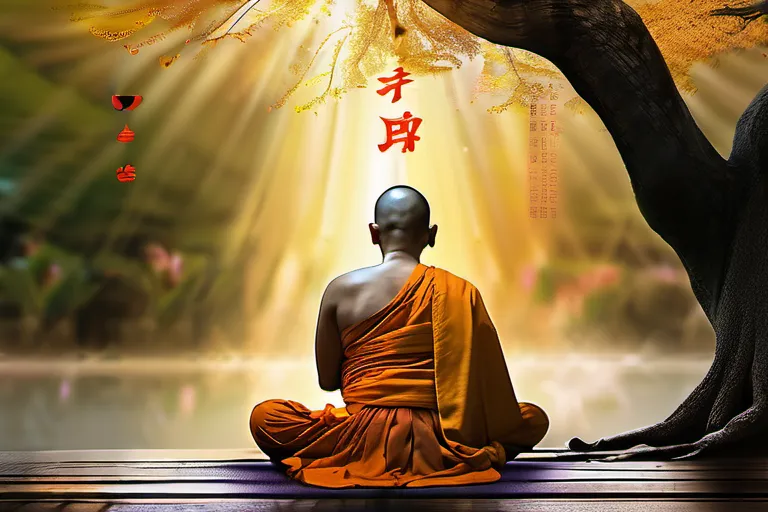Explore the fundamental concept of karma in Buddhism, its origins, and its impact on the spiritual journey.
Karma, a Sanskrit term meaning ‘action,’ is one of the central beliefs in Buddhism. This article delves into the intricacies of this concept, tracing its roots, understanding its role in Buddhist philosophy, and examining its implications for followers of this religion.
The Origin and Evolution of Karma
Understanding Karma: The Core Belief of Buddhism
“What goes around comes around,” echoes through many cultures, but in the context of Buddhism, this adage takes on a profound meaning rooted deeply within its core beliefs.
Karma, often translated as ‘action’ or ‘deed,’ is more than just an ethical concept; it’s a fundamental pillar that shapes the very fabric of Buddhist philosophy. The origins of karma trace back to ancient Hinduism, where it was first introduced in texts like the Bhagavad Gita and the Upanishads. However, as Buddhism evolved from its roots in India around the 5th century BCE, the concept of karma underwent a transformation, adapting to fit its unique spiritual framework.
Imagine life is like planting seeds; what you sow determines your harvest. In Buddhism, actions have consequences that ripple through one’s existence, impacting not just this lifetime but many lifetimes in a cycle known as samsara. This idea of impermanence and interconnectedness forms the basis of how karma is understood within Buddhist teachings.
The significance of karma in Buddhism lies not only in its impact on one’s personal journey towards enlightenment but also in the collective well-being of all beings. The goal, then, becomes to cultivate sukha (happiness) through positive actions and to avoid causing harm or suffering (dukkha). This pursuit is akin to navigating a delicate dance—each step mindful, each action considered.
As you delve deeper into the teachings of Buddhism, you’ll find that understanding karma is like peeling back layers of an onion. Each layer reveals more about the nature of existence and the responsibility one holds for their own path. By embracing this concept, one begins to see how their actions affect not just themselves but also those around them, fostering a sense of interconnectedness and compassion.
The Law of Karma: Cause and Effect
The law of karma, often described as the cause and effect principle, forms the bedrock upon which Buddhism stands. But what exactly does this mean? Is it simply a way to explain the world’s complexities or is there more to it than meets the eye?
Imagine life itself as a vast garden, where every seed you plant will inevitably grow into something. This garden is your mind, and each thought and action you take are like seeds, sown in a field of endless possibilities. The karma law suggests that these actions, whether they be kind or cruel, thoughtful or negligent, bear fruit in the future.
In Buddhism, every action has an effect; it’s not just about doing good deeds but understanding the nature and consequences of your actions. Good actions lead to positive outcomes, while negative actions result in suffering—a cycle that echoes through life after life until one reaches enlightenment.
- Good Actions: These are actions that promote happiness and well-being for oneself and others. Practicing metta, or loving-kindness, is a prime example. It not only benefits the recipient but also the giver, cultivating inner peace and contentment.
- Negative Actions: Conversely, negative actions are those that lead to suffering. They can be harmful thoughts or deeds, like anger or stealing. These actions create karmic seeds that ripen in this life or future lives, often leading to negative consequences.
The key to understanding karma lies in recognizing its role not just as a punishment or reward but as a guide for ethical living. By reflecting on the potential outcomes of our actions, we can make more conscious choices that lead us closer to Nirvana—a state free from suffering and desire.
So, next time you find yourself facing challenges in life, ask yourself: What seeds did I plant? And how can I nurture positive growth moving forward?
Embracing the law of karma is about more than just accepting responsibility for our actions; it’s a profound journey towards self-awareness and compassion. It reminds us that we are not isolated beings but interconnected threads in an intricate web of existence, where each thread influences the others.
Three Types of Karma: Karmic Actions
Now, let’s delve into the fascinating and intricate world of karmic actions, which are central to understanding the spiritual journey in Buddhism. Imagine life as a garden where every seed you plant has the potential to grow into something magnificent or mundane. In this metaphor, your karmic actions are like those seeds, and their nature—whether positive or negative—determines what blossoms.
In Buddhist philosophy, there are three types of karma that shape a person’s journey: Sanchita Karma, Prarabdha Karma, and Agami Karma. Each type represents a different phase in the life cycle of karma. Let’s explore each one:
- Sanchita Karma: This is like a vast storehouse of seeds that you have accumulated from countless lifetimes past. These seeds are there, dormant but ever-present, ready to sprout at any moment depending on the conditions and your actions in this life.
- Prarabdha Karma: Once you plant some of those seeds (through your current actions), they start growing into visible results. This is the karma that is currently manifesting in your life—what you are experiencing right now. It’s like seeing a flower bloom, knowing it was always there but now it’s visible.
- Agami Karma: These are the seeds you sow with every action today. They represent what you will plant for future lives and experiences. The decisions you make today will determine your future—just like choosing a flower to plant in your garden determines its beauty tomorrow.
The interplay of these three karmas is akin to a dance where each step influences the next. By understanding this dynamic, Buddhists can take conscious actions to cultivate positive karma and reduce negative karma, shaping their lives and spiritual journeys with greater purpose.
Karma and Rebirth: The Wheel of Life
Imagine life as a vast, endless wheel, constantly turning and spinning us through existence. In Buddhism, this concept is known as rebirth, where the cycle of life, death, and rebirth—reincarnation or samsara, is intricately linked with karma.
So, what exactly is rebirth in Buddhism? It’s not just about dying and being born again; it’s a continuous process influenced by one’s past actions. Karma, the sum total of an individual’s actions, thoughts, and intentions, determines our future existence. The more positive or negative karma we accumulate, the higher or lower realms of existence we might find ourselves in.
Consider this: Every time you make a choice, good or bad, it shapes not only your current life but also your next incarnation. It’s like planting seeds—what you sow today will bloom tomorrow, whether it be joy or suffering. The prarabdha karma, the ripe fruits of past actions that are currently affecting your present, constantly influences your rebirth and circumstances.
The cycle of rebirth is both a challenge and an opportunity. It’s a path where every moment counts, much like navigating through a maze. To break free from this endless loop, one must achieve Nirvana, the ultimate goal in Buddhism. This isn’t just about escaping existence; it’s about reaching a state of enlightenment where all karmic bonds are severed.
Rebirth and karma form the core of Buddhist practice, urging followers to lead ethical lives. By understanding and accepting this cycle, one can make conscious decisions that lead towards spiritual growth and ultimately, liberation from suffering.
Karma and Ethics: The Path to Enlightenment
Imagine walking through a dense forest, where every step you take could lead to a path less traveled or one that’s well-worn. In Buddhism, your life is much like this journey, with each action creating ripples in an endless pond of karma. How do these actions shape the path you walk?
Karma, in Buddhism, is not just about cause and effect; it’s a profound ethical compass that guides one towards enlightenment. When adherents talk about following the path of good actions, they’re emphasizing the importance of making choices that lead to positive outcomes. Think of karma as the silent architect behind your life’s story—every deed you perform leaves an imprint on this narrative.
But what exactly does it mean to adhere to good actions? For Buddhists, it involves living a life filled with compassion and wisdom. This isn’t just about being kind; it’s about understanding the interconnectedness of all beings and acting accordingly. When you choose to help someone in need, or refrain from harming another, you’re not only benefiting others but also cultivating virtues within yourself that will eventually lead to inner peace and enlightenment.
The ethical implications of karma are far-reaching. By focusing on wholesome actions—such as generosity, patience, and ethical conduct—you create a virtuous cycle that benefits both yourself and others. Is there any other way to truly bring joy into your life beyond making these choices?
This journey towards enlightenment through good actions isn’t easy; it requires constant self-reflection and mindfulness. Every moment is an opportunity to make positive changes, no matter how small they may seem at the time. It’s like planting seeds in a garden—some might sprout quickly, while others take their time, but all contribute to the beauty of your spiritual landscape.
In essence, karma serves as a constant reminder that our lives are interconnected and that every action has consequences. By choosing good actions, you’re not just shaping your own destiny; you’re also contributing to the greater harmony of existence. Are you ready to embrace this journey towards enlightenment?
The Role of Karma in Modern Buddhism
In modern times, how do Buddhists interpret and apply the ancient concept of karma? Is it still relevant in today’s fast-paced world, where technology and globalization have transformed our daily lives? Karma, in Buddhism, is not just a mystical notion; it’s a lived reality that shapes one’s existence. Imagine karma as a continuous river flowing through your life, carrying with it the consequences of every action you take. Every choice you make, every thought you think, contributes to this flow.
Many modern Buddhists see karma as a guide for ethical living, emphasizing the importance of intention and motivation behind actions. How you act now will inevitably affect your future experiences. This perspective encourages mindfulness and self-reflection, urging individuals to cultivate wholesome deeds that lead to positive outcomes. In essence, it’s about creating a virtuous cycle where good intentions beget more goodness.
However, the interpretation of karma in modern Buddhism isn’t uniform. Some practitioners see it as an empowering tool for personal growth, while others may view it with skepticism or even resistance. The concept can feel daunting, reminiscent of a relentless judge always watching your every move. But perhaps this is precisely what makes it so compelling—it forces us to be accountable and intentional in our actions.
So, how do you integrate karma into your modern spiritual practice? By recognizing that every moment presents an opportunity for transformation. Every interaction can either nourish or poison the river of karma. This understanding doesn’t aim to control but rather invites introspection and awareness. It’s about embracing the journey, not just arriving at enlightenment.
Conclusion
 By the end of this article, you will have a comprehensive understanding of karma in Buddhism. You’ll learn about the law of karma, the three types of karma, and how they shape one’s spiritual journey towards enlightenment.
By the end of this article, you will have a comprehensive understanding of karma in Buddhism. You’ll learn about the law of karma, the three types of karma, and how they shape one’s spiritual journey towards enlightenment.











